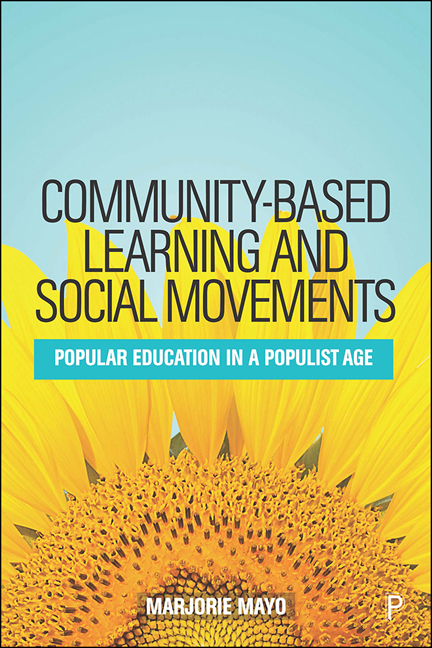Book contents
- Frontmatter
- Dedication
- Contents
- List of Figures
- Acknowledgements
- 1 Popular Education in a Populist Age
- 2 Popular Education and its Roots
- 3 Spaces and Places for Popular Education and Participatory Action Research
- 4 Principles and Practice
- 5 Sharing Understandings of Varying Histories and Cultures
- 6 Making Connections: Linking Issues and Struggles Across Space and Time
- 7 Power and Power Analysis
- 8 Community–University Partnerships
- 9 Taking Emotions into Account
- 10 Looking Backwards, looking Forwards
- References
- Index
8 - Community–University Partnerships
Published online by Cambridge University Press: 10 March 2021
- Frontmatter
- Dedication
- Contents
- List of Figures
- Acknowledgements
- 1 Popular Education in a Populist Age
- 2 Popular Education and its Roots
- 3 Spaces and Places for Popular Education and Participatory Action Research
- 4 Principles and Practice
- 5 Sharing Understandings of Varying Histories and Cultures
- 6 Making Connections: Linking Issues and Struggles Across Space and Time
- 7 Power and Power Analysis
- 8 Community–University Partnerships
- 9 Taking Emotions into Account
- 10 Looking Backwards, looking Forwards
- References
- Index
Summary
If knowledge is power, as the previous chapter has suggested, then universities and colleges should have particularly important contributions to make. Universities should be embedded within their communities rather than simply focusing on serving elites, in Paulo Freire's (1996a) view, supporting the development of popular education and participatory action research as central to their remits for knowledge creation and knowledge dissemination more generally. As joint UNESCO Chairs in Community-Based Research and Social Responsibility in Higher Education, Budd Hall and Rajesh Tandon have been building on the ideas of Paulo Freire and Orlando Fals Borda and others in more recent times, as previous chapters have illustrated, advocating the co-construction of knowledge and respectful partnerships between communities, universities and governments. Much is being done to develop strategies for taking these types of partnership forward for the future. The Knowledge for Change (K4C) consortium represents precisely such an outcome from the joint UNESCO Chairs in Community-Based Research and Social Responsibility in Higher Education, providing training for community-based researchers within and outside academia.
The possibilities for developing such partnerships could be expected to expand, if the expansion of universities were to be the key determinant. In UK alone, the number of universities has grown from 46 to over 140 over the past three decades or so, part of wider international trends (Collini, 2017). But universities’ expansion is only one aspect of recent developments. Before reflecting on the lessons, as well as the achievements, of community–university collaborations, past and present, this chapter summarises some of the issues to be faced in the contemporary context. Like communities in so many contexts, universities and colleges have been facing major challenges. Processes of marketisation have been impacting on their capacities to engage, impacts that have been compounded by the effects of austerity, as Chapter 3 has already suggested. These processes pose fundamental questions as to what universities should actually be for, along with fundamental questions about the very nature of knowledge, whose knowledge and whose truth – to be explored in whose interests?
What are universities for? And why does it matter?
Marketisation is far from being a new phenomenon, as E.P. Thompson's reflections on ‘Warwick University Ltd’ demonstrated, some 50 years ago (Thompson, 1970).
- Type
- Chapter
- Information
- Community-based Learning and Social MovementsPopular Education in a Populist Age, pp. 137 - 154Publisher: Bristol University PressPrint publication year: 2020



